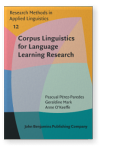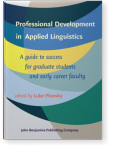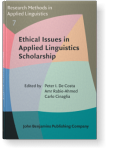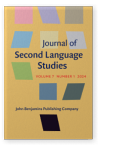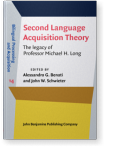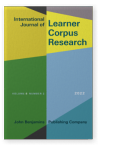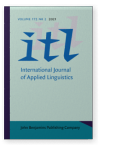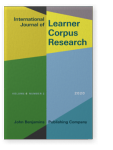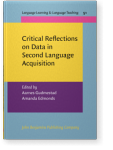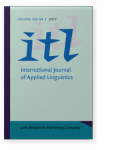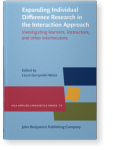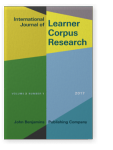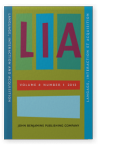Luke Plonsky
Formerly known as Ekaterina Sudina
List of John Benjamins publications for which Luke Plonsky plays a role.
Book series
Title
Professional Development in Applied Linguistics: A guide to success for graduate students and early career faculty
Edited by Luke Plonsky
[Not in series, 229] 2020. vi, 204 pp.
Subjects Applied linguistics
2024 Chapter 19. The ethical gray area: Journal editors’ perspectives Ethical Issues in Applied Linguistics Scholarship, De Costa, Peter I., Amr Rabie-Ahmed and Carlo Cinaglia (eds.), pp. 341–354 | Chapter
This chapter is a collective reflection on key ethical dilemmas encountered by four past and/or current editors of journals in diverse sub-fields of Applied Linguistics. We reflect on (i) our understanding of ethics in relation to journal editing; (ii) specific ethical challenges we faced in our… read more
2024 Chapter 1. A taxonomy of questionable research practices in quantitative humanities Ethical Issues in Applied Linguistics Scholarship, De Costa, Peter I., Amr Rabie-Ahmed and Carlo Cinaglia (eds.), pp. 10–27 | Chapter
A growing body of research has begun to address ethical issues in the context of Applied Linguistics (e.g., De Costa, 2016; Isbell et al., 2022). One of the messages inherent in this line of inquiry is that ethical concerns are embedded throughout the research cycle from study conceptualization… read more
2024 The effects of frequency, duration, and intensity on L2 learning through Duolingo: A natural experiment Journal of Second Language Studies 7:1, pp. 1–43 | Article
Instructed second language (L2) research has frequently addressed the effects of spacing, or, alternatively, the distribution of practice effects. The present study addresses Rogers and Cheung’s (2021) concerns about the ecological validity of such work via a natural experiment (Craig et al.,… read more
2022 Chapter 2. Taking the Long view: A bibliometric analysis Second Language Acquisition Theory: The legacy of Professor Michael H. Long, Benati, Alessandro G. and John W. Schwieter (eds.), pp. 9–28 | Chapter
By any definition, Michael Long was a giant in the field of second language acquisition (SLA). He was one of the very few who could truly wed language learning and language teaching which he did in a seamless fashion. His impact is far-reaching and envelops a number of different areas as we will… read more
2022 On learner characteristics and why we should model them as latent variables International Journal of Learner Corpus Research 8:2, pp. 237–260 | Article
Learner corpus research has a strong tradition of collecting metadata. However, while we tend to collect rich descriptive information about learners on directly measurable variables such as age, year of study, and time spent abroad, we frequently do not know much about learner characteristics… read more
2021 Language learning grit, achievement, and anxiety among L2 and L3 learners in Russia ITL - International Journal of Applied Linguistics 172:2, pp. 161–198 | Article
Although most research into grit – an individual difference that encompasses perseverance and passion for achieving long-term goals – has taken a domain-general perspective (e.g., Duckworth et al., 2007), emerging interest in a domain-specific approach to grit (e.g., Clark & Malecki, 2019)… read more
2020 Inter-rater reliability in Learner Corpus Research: Insights from a collaborative study on adverb placement International Journal of Learner Corpus Research 6:2, pp. 237–251 | Article
In Learner Corpus Research (LCR), a common source of errors stems from manual coding and annotation of linguistic features. To estimate the amount of error present in a coded dataset, coefficients of inter-rater reliability are used. However, despite the importance of reliability and internal… read more
2020 Chapter 5. Towards achieving work-life balance in academia: Comments and personal essays from six applied linguists Professional Development in Applied Linguistics: A guide to success for graduate students and early career faculty, Plonsky, Luke (ed.), pp. 49–64 | Chapter
The competing demands of teaching, research, and service seem to never end. Consequently, as academics, we often find ourselves feeling unable to realize our professional goals while also maintaining a life outside of work. Recognizing that there is no one-size-fits-all way to achieve or… read more
2018 Conclusion: Data, open science, and methodological reform in second language acquisition research Critical Reflections on Data in Second Language Acquisition, Gudmestad, Aarnes and Amanda Edmonds (eds.), pp. 219–228 | Miscellaneous
2017 The development of statistical literacy in applied linguistics graduate students ITL - International Journal of Applied Linguistics 168:1, pp. 4–32 | Article
Statistics play an important role in analyzing data in applied linguistics research. Given the increase over time in the field’s reliance on quantitative analysis (Brown, 2004; Gass, 2009), statistical literacy is critical for both producers and consumers of L2 research. Although there has been… read more
2017 Chapter 13. Look who’s interacting: A scoping review of research involving non-teacher/non-peer interlocutors Expanding Individual Difference Research in the Interaction Approach: Investigating learners, instructors, and other interlocutors, Gurzynski-Weiss, Laura (ed.), pp. 305–324 | Chapter
Despite the presence of non-teacher/non-peer learner interlocutors in primary (e.g., Gass and Varonis, 1985; M. H. Long, 1983; Varonis & Gass, 1985a, 1985b) and meta-analytic (Li, 2010) studies, and in interactionist theory and review articles (M. H. Long, 1996; Mackey & Goo, 2007), the… read more
2017 Quantitative research methods and study quality in learner corpus research International Journal of Learner Corpus Research 3:1, pp. 61–94 | Article
This study aims to provide the first empirical assessment of quantitative research methods and study quality in learner corpus research. We systematically review quantitative primary studies referenced in the Learner Corpus Bibliography (LCB), a representative bibliography of learner corpus… read more
2013 Focus on form and vocabulary acquisition in the Spanish L2 classroom Language, Interaction and Acquisition 4:1, pp. 1–24 | Article
This study examined lexical development from an interactionist perspective. More specifically, we investigated student gains in seven specific vocabulary words as a function of their frequency of occurrence and the type and amount of focus on form episodes related to them. Pretests and posttests… read more
